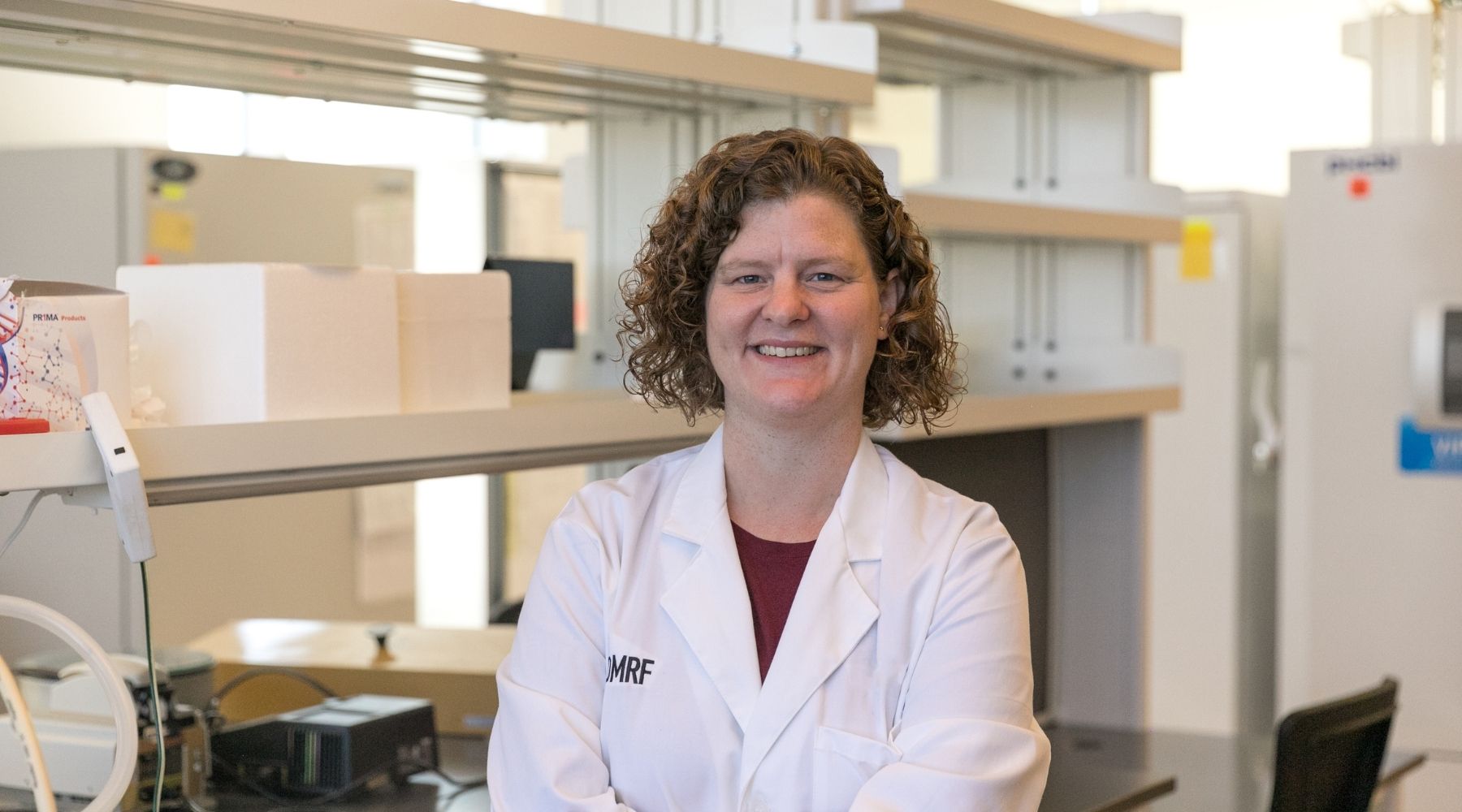Audrey Cleuren, Ph.D.
Assistant Professor
Cardiovascular Biology Research Program
My 101
Blood vessels are lined with a layer of special cells called endothelial cells, which create a barrier between the blood and the body. These cells control blood flow and move oxygen and nutrients, but they also have different functions based on their location. For example, brain endothelial cells need to be tightly connected to protect the central nervous system from outside substances. In the kidneys, they act like a filter to remove waste from the blood. We know endothelial cells have unique functions in different organs, but we do not understand how this specialization happens.
Using research models, we have started unraveling the genes that make endothelial cells different. Understanding how these cells work is important because many diseases are caused by a disruption of their location-specific functions. My research focuses on studying endothelial cell processes that contribute to disease progression, which will help us identify targets for treatments.
Research
Endothelial cells (ECs) form a critical barrier between circulating blood and parenchymal cells and play a central role in the physiologic regulation of nutrient transport, vascular tone, cell adhesion and blood fluidity. However, the endothelium also plays an important role in pathological conditions, either as a passive bystander, or more frequently as an active contributor to pathogenesis. Despite this known contribution, in vivo studies addressing gene expression programs underlying different EC phenotypes have been relatively limited, as ECs are highly heterogeneous and poorly accessible given their low numbers and interspersed distribution within tissues. By combining transgenic mouse models and high-throughput sequencing methods we have been able to accurately profile endothelial cells directly from their native in vivo environment, showing a high degree of endothelial heterogeneity across organs.
We are now expanding these studies by investigating the molecular mechanisms underlying EC (dys)function in pathologic conditions, with a particular focus on unraveling the contribution of the endothelium in the host response to infection. ECs play a key role in orchestrating this host reaction by activating inflammation and coagulation pathways to contain the pathogen and prevent its dissemination via the vascular compartment. However, an uncontrolled or maladaptive response can lead to EC dysfunction. This is characterized by increased vascular permeability, reduced endothelial reactivity and a dysregulation in the hemostatic and inflammatory properties of the endothelium, which can eventually result in coagulopathies as seen in sepsis or hemorrhagic fevers. We have previously modeled bacterial sepsis by injecting mice with lipopolysaccharide (LPS), showing that there is vascular bed-specific variation in endothelial reactivity in response to LPS exposure. Similar studies using viral pathogens are ongoing and aim to identify commonly shared mechanisms and key regulators affecting EC function in bacterial and viral infections, with the ultimate goal to establish disease-specific targets that can be used for therapeutic interventions.
Brief CV
Education
B.S., University of Leiden, Leiden, the Netherlands, 2005
M.S., University of Leiden, Leiden, the Netherlands, 2007
Ph.D., Einthoven Laboratory for Experimental Vascular Medicine, Leiden, the Netherlands, 2011
Honors and Awards
Outstanding Poster Award, North American Vascular Biology Organization, 2017
Young Investigator Award, International Society on Thrombosis and Haemostasis, 2011, 2015
Science Prize, Dutch Society on Thrombosis and Hemostasis, 2011
Activities
Arteriosclerosis, Thrombosis, and Vascular Biology (ATVB), ad hoc manuscript reviewer
Journal of Thrombosis and Haemostasis, ad hoc manuscript reviewer
eLife, ad hoc manuscript reviewer
Memberships
International Society on Thrombosis and Haemostasis, 2009-present
American Heart Association, 2015-present
North American Vascular Biology Organization, 2016-present
American Society of Hematology, 2017-present
Joined OMRF’s scientific staff in 2021
Publications
Recent Publications
Verma R, Cleuren A, Hinkovska-Galcheva V, Decker I, Kelly R, Ginsburg D, Shayman JA. Heat shock protein 70s are modifiers of endothelial function in Fabry disease. Kidney Int, 2026 January, PMID: 41579958
Negri S, Nyul-Toth A, Milan M, Troyano-Rodriguez E, Tavakol S, Ihuoma J, Reyff Z, Rudraboina R, Gulej R, Jang R, Csiszar A, Ungvari Z, Cleuren A, Miller DR, Yabluchanskiy A, Tanter M, Tarantini S. A Minimally Invasive Framework Reveals Region-Specific Cerebrovascular Remodeling in Aging Using Intravital Functional Ultrasound Imaging and Ultrasound Localization Microscopy (fUS-ULM). Adv Sci (Weinh):e10754, 2025 September, PMID: 40946188, PMCID: PMC12767048
Rajala R, Cleuren ACA, Griffin CT. Acetaminophen Overdose Reveals PAR4 as a Low-Expressing but Potent Receptor on the Hepatic Endothelium in Mice. Arterioscler Thromb Vasc Biol, 2024 October, PMID: 39360412, PMCID: PMC11668627
Selected Publications
Cleuren AC, Van der Ent MA, Jiang H, Hunker KL, Yee A, Siemieniak DR, Molema G, Aird WC, Ganesh SK, Ginsburg D. The in vivo endothelial cell translatome is highly heterogeneous across vascular beds. Proc Natl Acad Sci USA 2019;116(47):23618-23624. PMID: 31712416, PMCID: PMC6876253.
Zhang N, Czepielewski RS, Jarjour NN, Erlich EC, Esaulova E, Saunders BT, Grover SP, Cleuren AC, Broze GJ, Edelson BT, Mackman N, Zinselmeyer BH, Randolph GJ. Expression of factor V by resident macrophages boosts host defense in the peritoneal cavity. J. Exp. Med. 2019; 216(6):1291-1300. PMID: 31048328, PMCID: PMC6547866.
Westrick RJ, Tomberg K, Siebert AE, Zhu G, Winn ME, Dobies SL, Manning SL, Brake MA, Cleuren AC, Hobbs LM, Mishack LM, Johnston AJ, Kotnik E, Siemieniak DR, Xu J, Li JZ, Saunders TL, Ginsburg D. Sensitized mutagenesis screen in Factor V Leiden mice identifies thrombosis suppressor loci. Proc Natl Acad Sci USA. 2017;114(36):9659-9664. PMID: 28827327, PMCID: PMC5594664.
Everett LA, Cleuren AC, Khoriaty RN, Ginsburg D. Murine coagulation factor VIII is synthesized in endothelial cells. Blood. 2014;123(24):3697-705. PMID: 24719406, PMCID: PMC4055920.
Cleuren AC, van der Linden IK, De Visser YP, Wagenaar GT, Reitsma PH, van Vlijmen BJ. 17α-Ethinylestradiol rapidly alters transcript levels of murine coagulation genes via estrogen receptor α. J Thromb Haemost. 2010;8(8):1838-46. PMID: 20524981
Contact
Cardiovascular Biology Research Program, Mail Stop 45
825 NE 13th Street
Oklahoma City, Oklahoma 73104
Phone: (405) 271-4785
E-mail: Audrey-Cleuren@omrf.org
For media inquiries, please contact OMRF’s Office of Public Affairs at news@omrf.org.
Lab Staff
Mariko Kudo, Ph.D.
Staff Scientist
Abigail Kordeliski, Ph.D.
Postdoctoral Scientist
Debra Saunders
Research Technician IV
Megan Runion
Graduate Student
Rachel Hubbard
Administrative Assistant II



